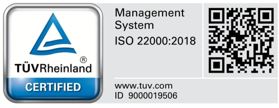Title Page
-
Document No.: ISO22000-SYS-07R3
-
Revision No.: 1
-
Implementation Date: 01 February 2022
-
Section / Outlet
-
Date & Time of Audit
-
Manager In-Charge
-
This document is considered CONFIDENTIAL, it may contain classified data and information. This is not to be reproduced without permission from the General Manager and/ or Hygiene & Sanitation Manager.
Amanpulo Food Safety & Sanitation Policies
FSSP 1: Personal Hygiene & Health
-
No jewelry other than a plain wedding band?
-
Fingernails trimmed short? No nail varnish?
-
Well-groomed short haircut (male staff)?
-
Tidy hair grooming (female staff)?
-
Well-trimmed facial hair?
-
Clean uniform and apron?
-
Are all identified food handlers issued food thermometers?
-
No personal belongings?
-
Are employees not eating in the F&B areas?
-
Are staff not displaying bad habits inside F&B areas?
-
Are all of the employees free of infected wounds?
-
In the case of the wound, did the staff cover it with a band-aid and wear disposable gloves?
-
Are the staff aware that band aids need to be changed every 4 hours?
FSSP 2: Hand Washing
-
Are hand washing stations available inside the kitchen and other high-risk areas?
-
Hand washing stations with complete amenities?
-
Can staff demonstrate the correct hand washing procedure?
FSSP 3: Vendors Assurance
-
Are all food and beverage products purchased from accredited suppliers?
-
Does the AFSMS team periodically audit high-risk suppliers?
- C
- NC
- N/A
FSSP 4: Receiving Inspection
-
Are the daily delivery records available, completed and verified?
-
Do receiving personnel and food porters wear hair restraints and have their fingernails trimmed?
-
Do receiving staff and food porters perform hand washing before handling the products?
-
Frozen Food temperature: ≤ -12°C
-
Chilled Food temperature: ≤ 5°C
FSSP 5: Sanitizing of Fruits & Vegetables
-
Are sanitizing sinks and sanitizers for fruits and vegetables available in the receiving area and kitchens?
-
Does the staff know how to demonstrate the sanitizing process? pH of Sanitizer <br>(1.0-3.0)
-
Contact duration of products for sanitizer? 60 seconds
-
Are sanitizing test strips available?
-
Are sanitizing record available?
FSSP 6: Chiller & Freezer Temperature Requirements & Maintenance
-
Are all chillers and freezers clean and rust-free, with good gaskets, no frost condensation or leaks, no exposed wires, lights covered, clean and rust-free shelves, and no gaps in the floors and walls?
-
Are gauges in good condition and calibrated with sticker tags?
-
Are chiller and freezer records available, completed and verified?
-
Chiller Internal Temp.: </= 5°C
-
Freezer Internal Temp.: </= -18°C
-
Is staff aware of action to be taken once the above temp is not met?
FSSP 7: Usage of Disposable Gloves
-
Are disposable gloves used when handling ready-to-eat food or when dealing with a wound or sore?
-
Is staff performing handwashing before wearing gloves?
-
Is a paper towel used over a gloved hand when touching surfaces?
FSSP 8: Storage & Transportation Requirements
-
Is RTE above or separate from raw food?
-
Is fish above meat, meat above poultry? Is poultry always on the bottom shelf?
-
Are items wrapped, covered, and stacked properly?
-
No dirty outer cartons inside the chiller? No dirty crates or containers?
-
Are items stored following proper clearance in food storage? 6 inches - from floor and wall 2 inches – walls 12 inches - from evaporator 1 inch - stacked crates
-
Is the dry store clean and organized?
-
Are products with a production label or date of expiration, FIFO followed?
-
Do canned products have no dents, rust, or bloating? No open package/tin/bottle/bag?
-
Are glass items stored at the bottom shelves?
-
No evidence of pest infestation?
-
(Central Storage) Temperature monitored at </=25°C; Humidity at </=65%.
-
Is the monitoring form available, updated, completed, and verified?
-
No operating equipment or personal belongings stored?
FSSP 9: Chopping Boards and Knives
-
Does staff follow color coding policy?
-
Is the staff able to demonstrate proper cleaning and sanitizing procedures?
-
Is the staff aware of when to wash and sanitize cutting boards and knives?
-
Are cleaning tools available?
-
Are boards, knives, and racks clean?
-
Are boards free of deep groves, cracks, and molds? Knives without engravings?
-
Is sashimi and other RTE fish prepared with a designated cutting board and knife?
FSSP 10: Thawing
-
Are thawing processes inside chillers and running water evident?
-
No thawing of items in ambient temperature?
-
Are items while thawing well-segregated from other products?
-
Are items that have been thawed in a chiller and running water labeled with the date and time?
-
Are food-grade sanitized containers used while thawing? No items thawed directly in the sink?
-
Is staff aware of the maximum time allowed for thawing in running water? (2 hours)
-
Is staff aware of the secondary shelf life of items thawed in running water?(24 hours)
FSSP 11: Secondary Shelf Life
-
Are all opened/produced food and beverage products labeled with a date and time?
-
Does the date and time label follow the format (dd/mm/yyyy)?
-
No expired products?
FSSP 12: Cooking Temperature Requirements
-
Ask the chef to demonstrate how to take cooking temperatures using a calibrated thermometer.
-
Are cooking and heating records available, completed and verified?
-
Are chefs knowledgeable of the different food temperature requirements?
-
74°C - Poultry (Solid & Ground), Stuffed Products (Raw & Cooked Combine), Food Products Cooked in Microwave
-
70°C - Ground/Flaked Meat & Fish, Processed Meat Products
-
63°C and above - Pork, Beef, Veal, Lamb, etc., Fish & Seafood, Vegetables & Fruits, Egg Dishes, All Other Products
FSSP 13: Cooling of Hot Food
-
Is the staff knowledgeable of the cooling process?
-
Cool hot food to 10°C for 1.5 hours max and proceed cooling it to 5°C in 2.5 hours max.
-
Are chilled items covered with cling film and labeled? Is enough ice used for the water bath?
-
Is the blast chiller clean and free from rust?
-
Is staff knowledgeable about the action to be taken if correct cooling is not achieved?
-
Are food products reheated to 75°C?
-
Is staff knowledgeable that if product quality is affected, it should be discarded and made a new batch?
-
Are cooling records available, completed and verified?
FSSP 14: Reheating of Food
-
Is the staff aware of the reheating temperature requirement?
-
Are cooling records available, completed and verified?
FSSP 15: Plating of Food
-
Is plating of food done in an area with room temperature </= to 20°C or within 45 minutes?
-
Are staff wearing gloves during plating?
FSSP 16: Hot & Cold Holding of Food
-
Ask staff about temperature requirements for hot and cold holding of food.
-
Hot food: 63°C and above
-
Cold food: 8°C and below
-
Are service holding records available, updated, completed, and verified?
-
Is a new batch of food not added to the existing?
-
At the end of the serving period, are all remaining foods on display discarded regardless of temperature?
FSSP 17: Ice Machine Maintenance
-
Are ice machines kept closed and covered to keep them clean and sanitary at all times?
-
Are ice machines used only for the storage of ice for consumption?
-
Is a dedicated ice scooper soaked in sanitizer solution used for scooping ice?
-
Cleaning, sanitizer changing and preventive maintenance records available and updated based on schedule at each machine?
FSSP 18: Dishwashing Machine & Pot Washing Station
-
Is the steward knowledgeable of temperature changes and water requirements?
-
Is the dishwashing machine meeting temperature requirements?
-
Main wash-55-65°C, Final rinse-82-86°C, Exit plate-71°C (thermolabel)
-
No presence of rust, leaks, lime scale, slime, and dirt build up?
-
Are PWS amenities fully available?
-
Warm water supply, instructions (wash, rinse, sanitize), detergent and sanitizer supply, cleaning tools, waste bin with lid, and non-wood shelving.
-
Are all items turned upside down?
FSSP 19: Food Allergen
-
Is the staff knowledgeable of the common food allergens? (Gluten, eggs, dairy, poultry, fish and seafood, nuts, cereals and legumes)
-
Is the staff well-versed in dealing with guests' allergen concerns?
-
Does the service staff give clear instructions on allergens and the chef to separate preparation and avoid using products with allergens?
FSSP 20: Bar & Kitchen Equipment Maintenance
-
Is all bar and kitchen equipment clean and sanitized?
-
Is there any damaged or rusted bar or kitchen equipment?
FSSP 21: Microtesting Program
-
Is a Microtesting program available to cover the food and beverage operations at a defined interval?
FSSP 22: Chemical Storage and Handling
-
Is a chemical store room or chemical kit available for proper storage?
-
Are all chemical spray bottles and dispensers labeled?
-
Is the chemical room clean, dry, cool, well lit, ventilated, and out of sunlight?
-
Is MSDS available and updated for all chemicals?
-
Are acid, alkaline, and chlorine products stored separately?
-
Is safety gear (goggles, hand gloves, and lab coat) available?
FSSP 23: Waste Management
-
Are garbage bins with foot pedals clean and lined with garbage bags?
-
Is proper segregation practiced?
FSSP 24: Cleaning, Sanitizing & Disinfection
-
Is cleanliness from ceiling to floor evident in each area?
-
Are cleaning tools properly stored and in good condition?
-
Are all other equipment free from rust dirt, mold, grease and slime build up?
FSSP 25: Facilities & Maintenance
-
Is there a facility defect in the ceiling or wall-to-floor areas?
-
Is the room air conditioning supply properly working?
-
No defective bar or kitchen equipment?
FSSP 26: Pest Control Management
-
No pest sightings?
-
No pest droppings?
-
No possible entry point for pests from the environment?
-
Is the fly insecutor or bait traps evidently set up in each area for preventive measures?
FSSP 27: Internal Audit
-
Are all areas of the AFSMS internal audit covered on a monthly or every 2 months basis?
-
Do AFSMS internal auditors regularly attend the AFSMS internal audit?
-
Are audit reports communicated within 48 hours from the time of audit?
-
Do managers submit their corrective action reports within 7 days of receipt of the audit report?
FSSP 28: Food Recall
-
Are AFSMS Team and Operation personnel knowledgeable and trained in conducting food recall activities?
-
Is mock food recall activity conducted at least once a year?
-
Does the mock food recall activity pass the 2 hour maximum completion requirement?
FSSP 29: Alleged Food Borne Illness & Physical Contamination Investigation
-
Any food-borne illness complaints from this restaurant's or f&b areas' guests or employees?
-
Is there any physical contamination from guests or employees in this restaurant or f&b areas?
-
If yes, was it investigated?
-
If the complaint was found valid, did the AFSMS team provide a long-term corrective action? If there has been no complaint, there is no need to answer.
FSSP 30: Management Commitment
-
Did the AFSMS team and identified employees attend the eight-hour intensive food safety training course for newly hired employees?
-
Did the AFSMS team and identified employees attend the eight-hour refresher food safety training for existing employees?
-
Is the AFSMS meeting conducted every two months?
-
Is the AFSMS team and section/outlet in-charge in attendance?
Audited by:
-
Auditor







